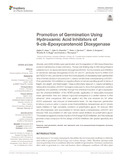JavaScript is disabled for your browser. Some features of this site may not work without it.
| dc.contributor.author | Awan, Sajjad Zahoor | |
| dc.contributor.author | Chandler, Jake O. | |
| dc.contributor.author | Harrison, Peter J. | |
| dc.contributor.author | Sergeant, Martin J. | |
| dc.contributor.author | Bugg, Timothy D. | |
| dc.contributor.author | Thompson, Andrew J. | |
| dc.date.accessioned | 2017-03-10T11:34:58Z | |
| dc.date.available | 2017-03-10T11:34:58Z | |
| dc.date.issued | 2017-03-01 | |
| dc.identifier.citation | Awan SZ, Chandler JO, Harrison PJ, Sergeant MJ, Bugg TD and Thompson AJ (2017). Promotion of germination using hydroxamic acid inhibitors of 9-cis-epoxycarotenoid dioxygenase. Front. Plant Sci. 8:357 | en_UK |
| dc.identifier.issn | 1664-462X | |
| dc.identifier.uri | http://dx.doi.org/10.3389/fpls.2017.00357 | |
| dc.identifier.uri | http://dspace.lib.cranfield.ac.uk/handle/1826/11596 | |
| dc.description.abstract | Abscisic acid (ABA) inhibits seed germination and the regulation of ABA biosynthesis has a role in maintenance of seed dormancy. The key rate-limiting step in ABA biosynthesis is catalysed by 9-cis-epoxycarotenoid dioxygenase (NCED). Two hydroxamic acid inhibitors of carotenoid cleavage dioxygenase (CCD), D4 and D7, previously found to inhibit CCD and NCED in vitro, are shown to have the novel property of decreasing mean germination time of tomato (Solanum lycopersicum L.) seeds constitutively overexpressing LeNCED1. Post-germination, D4 exhibited no negative effects on tomato seedling growth in terms of height, dry weight and fresh weight. Tobacco (Nicotiana tabacum L.) seeds containing a tetracycline-inducible LeNCED1 transgene were used to show that germination could be negatively and positively controlled through the chemical induction of gene expression and the chemical inhibition of the NCED protein: application of tetracycline increased mean germination time and delayed hypocotyl emergence in a similar manner to that observed when exogenous ABA was applied and this was reversed by D4 when NCED expression was induced at intermediate levels. D4 also improved germination in lettuce (Lactuca sativa L.) seeds under thermoinhibitory temperatures and in tomato seeds imbibed in high osmolarity solutions of polyethylene glycol. D4 reduced ABA and dihydrophaseic acid accumulation in tomato seeds overexpressing LeNCED1 and reduced ABA accumulation in wild type tomato seeds imbibed on polyethylene glycol. The evidence supports a mode of action of D4 through NCED inhibition, and this molecule provides a lead compound for the design of NCED inhibitors with greater specificity and potency. | en_UK |
| dc.language.iso | en | en_UK |
| dc.publisher | Frontiers Media | en_UK |
| dc.rights | © 2017 Awan, Chandler, Harrison, Sergeant, Bugg and Thompson. This is an open-access article distributed under the terms of the Creative Commons Attribution License (CC BY). The use, distribution or reproduction in other forums is permitted, provided the original author(s) or licensor are credited and that the original publication in this journal is cited, in accordance with accepted academic practice. No use, distribution or reproduction is permitted which does not comply with these terms. | |
| dc.subject | seed germination | en_UK |
| dc.subject | Abscisic Acid | en_UK |
| dc.subject | Hydroxamic acid | en_UK |
| dc.subject | 9-Cis-epoxycarotenoid dioxygenase | en_UK |
| dc.subject | dormancy | en_UK |
| dc.subject | Chemical Genetics | en_UK |
| dc.title | Promotion of germination using hydroxamic acid inhibitors of 9-cis-epoxycarotenoid dioxygenase | en_UK |
| dc.type | Article | en_UK |
Files in this item
This item appears in the following Collection(s)
-
Staff publications (SWEE) [2825]
